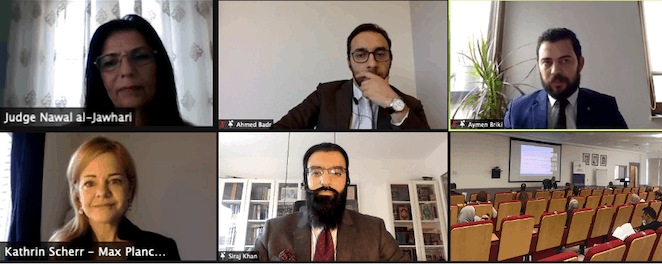Comparative Methods of Interpretation and Reasoning in the Application of Fundamental Rights were the main themes
Under the Component to build the capacity of Judges in the Governorates of Balqa and Zarqa in Jordan, the Max Planck Foundation conducted an intensive one-day workshop for 21 judges of the Civil Courts in Zarqa Governorate on 28 November 2020 via video-conference.
The workshop was formally inaugurated by HE Judge Nawal al-Jawhari, the Director of the Judicial Institute in Jordan, and HE Judge Hazem Mohammed Saeed, President of the Courts of First Instance of Zarqa, who welcomed the cooperation between the Foundation and the Courts in the two Governorates of Balqa and Zarqa. Judge al-Jawhari confirmed the support and facilitation of the Judicial Institute of Jordan, which is mandated with supporting the development, training and continued professional development of judges in Jordan. Judge al-Jawhari and Judge Hazem Saeed both stressed the importance of the topic, emphasizing that the context of a case, its facts and also the overriding sense of justice should be primary when interpreting legal provisions.
Foundation Experts delivered technical presentations on methods of judicial interpretation from a comparative perspective, judicial policy and interpretation and models of judicial reasoning and judicial decision making. A practical exercise with judges illustrated how judges can deal with conflicting judicial interpretations and the importance of judicial reasoning in navigating such conflicting interpretations. In this context, the specific role of the Dīwān Tafsīr al-Qawanīn (the Bureau for Interpretation of Laws) was discussed, which has a constitutionally mandated role for interpreting laws that have not been interpreted by the Courts. The workshop concluded with a presentation and discussion by several judges on judicial interpretations from their own decisions that assisted them in their practice as positive examples of dynamic and positive judicial interpretation and reasoning.
The workshop was the first in a series of activities with the Courts of Balqa under the Max Planck Foundation project, “Strengthening Legislative Compliance and Constitutional Interpretation in Jordan”, generously supported by the German Federal Foreign Office.

